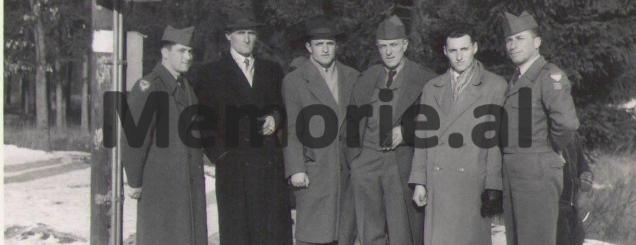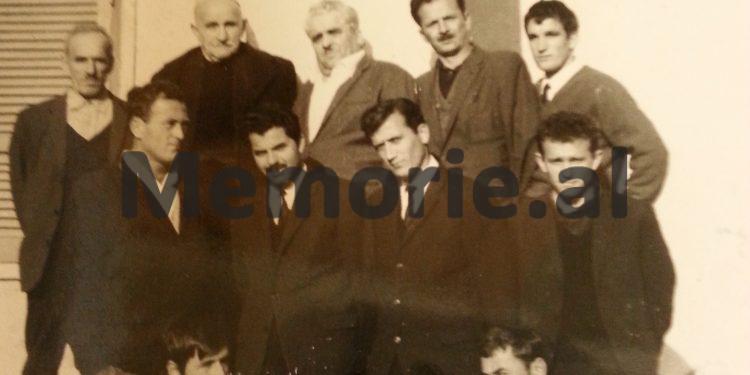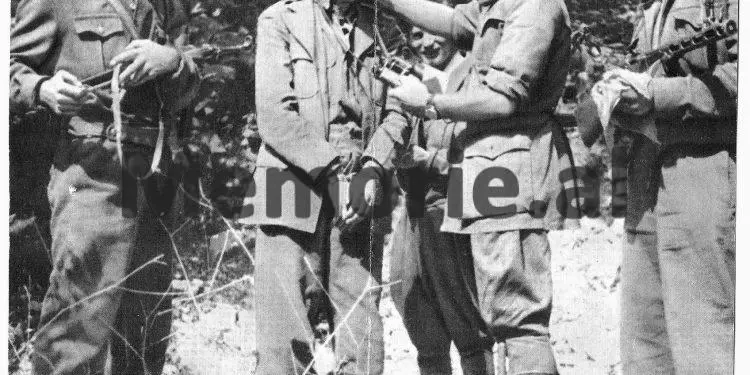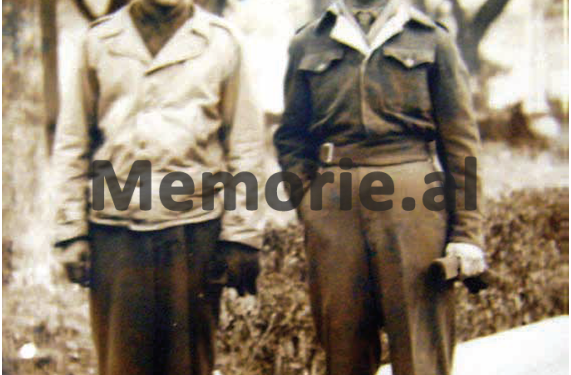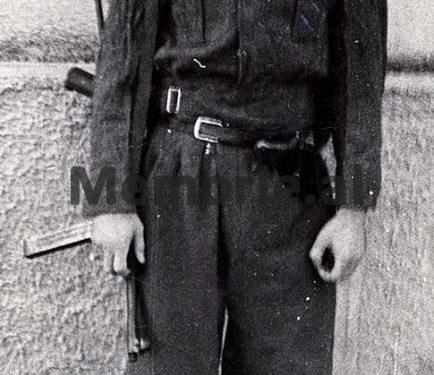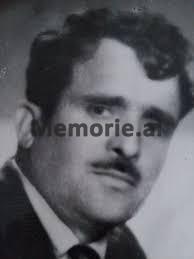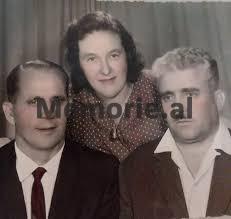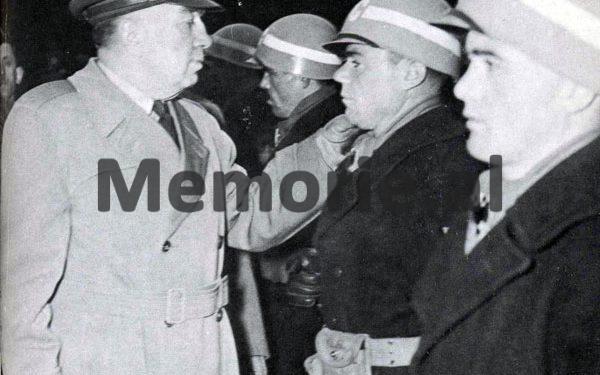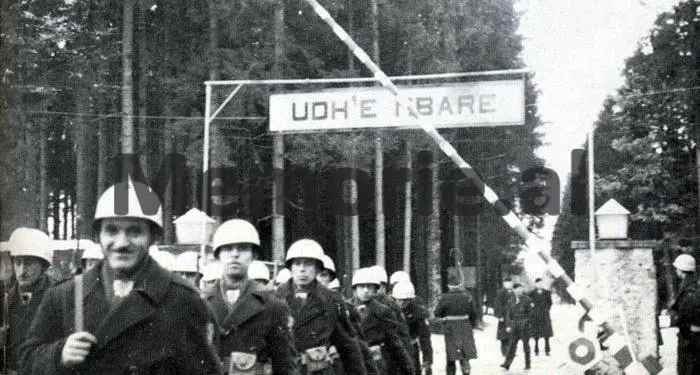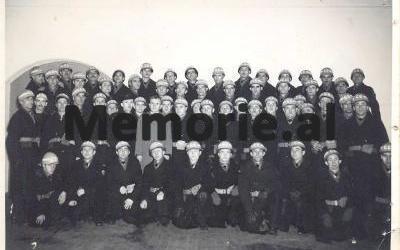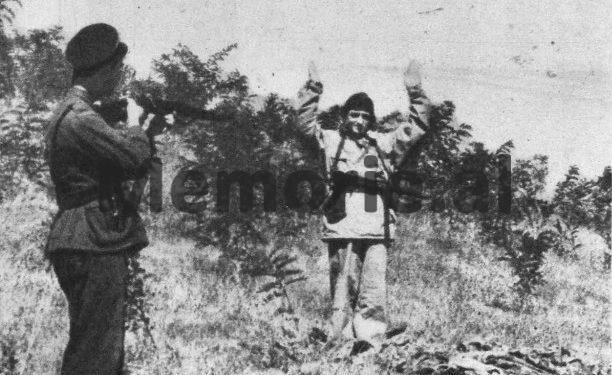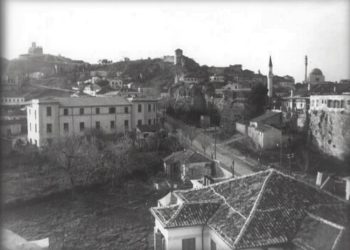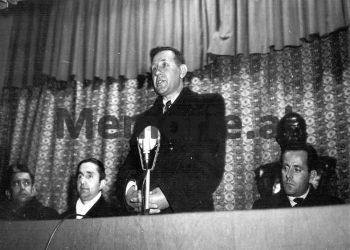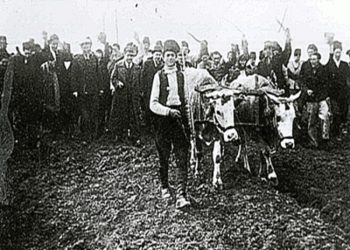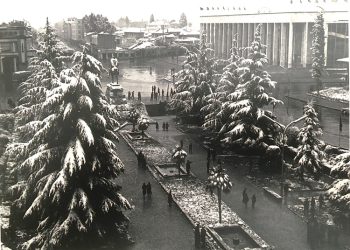Dashnor Kaloçi
Memorie.al publishes the unknown story of the Gjura family with origins from Reçi i Dibra, who during the time of the Zog Monarchy served as soldiers in the ranks of the Gendarmerie and in April 1939, when fascist Italy carried out military aggression against our country, Adem and Shaban Gjura, left for Durrës, as they had previously been armed in Mat by Haxhiu i Sul Kurti. The enlistment of the two Gjura brothers in the ranks of the Albanian National Army during the period of Nazi-fascist occupation of the country, after the call made by Regent Mehdi Frashëri to the former soldiers of the Monarchy to appear in duty and line up alongside the Legality forces under the command of Abaz Kup. Their refusal to take high positions and functions after the end of the War in the communist government and going to the mountains on the run to organize the anti-communist resistance together with some of the main leaders of the nationalist party like Muharrem Bajraktari etc. The escape of the two Gjura brothers from Albania and the inclusion of Adem in the “Company 4000” in the Federal Republic of Germany, where after several months of training by the Anglo-American military, he set off on a secret mission in Albania, parachuting into the mountains of Lura of Dibra district.
It was the beginning of November 1950, when a small United States Secret Service plane, launched from the training base codenamed “Company 4000”, was located somewhere on the outskirts of Munich, Federal Germany. after passing the airspace over the Adriatic Sea, it took the direction from the mountains of Dibra, over the forests of the Lura area. After two or three laps in that darkness of night over the place called the Great Field of Lura in the village of Selishte, from the small plane, a group of paratroopers commanded by Adem Gjura were thrown, who had fled Albania since the arrival of the communists. in power in 1945. Who was Adem Gjura, what was his past and with what mission did they come to Albania?
Gjura family from Reçi i Dibra
Ademi and his first cousin, Shaban Gjura, were born in 1910, in the province of Reçi, Dibra, whence the origin of that family known as a nursing home throughout the area. Adem’s father, Hysen Shabani, together with Brahim Gjoci of Lura and Halil Mena, was known as the leader of the Reçi area in the wars against the Serbs, who tried to cross the Drin River. In the early 1930s, as the Gjura family was a supporter of the Zog Monarchy, the two sons of this family, Ademi and Shabani, were sent to Tirana to continue their non-commissioned officer school. After graduating from that school, Ademi and Shabani worked for some time in the Gendarmerie weapon in Tirana. In the first days of April 1939, when fascist Italy carried out military aggression against Albania, Ademi and Shabani, and some other villagers from Reçi, after being supplied with weapons by Haxhiu i Sul Kurti in Mat, set out to fight in Durrës under the command of Major Abaz Kupit. Regarding this and the period of fascist occupation until the day they both went to the mountains as anti-communists, in his memoirs Shabani wrote: “At that time Adem and I were at home with ordinary permission, as we were still serving in the Gendarmerie weapon. As soon as we heard the news that the country was being invaded, we left to fight in Durrës, but when we arrived in Tirana, we saw that everything was over and so we were forced to return to Gjurrë Rec. After staying there for some time, together with Adem and some others we went to the mountains and although sporadically and disorganized in a limited local territory, as nationalists we were, we fought against the Italian invaders. In 1941, Ademi was mobilized in the Italo-Greek war at the head of a company, where he left the front, not wanting to fight against the Greeks. In 1943, when the Regiment of Mehdi Frashëri issued the order that all military personnel of Zog’s time should report for duty or else measures would be taken to deport their families, Ademi appeared before the General Gendarmerie Command and appointed to the post of Commander-in-Chief of Doda Castle with the rank of Marshal. Ademi has performed this task for a short time, because in the conditions and circumstances in which he was to perform that type of service, he left from time to time joining the forces of Abaz Kupi, where he also participated in the meeting held. to Guri i Vasha, with the leadership of the North and that of Mukje, as a representative of our area. Ademi then handed over that task and went to the mountains and joined the nationalist forces of the province of Dibra, to fight against other invaders, the Germans.
On the mountain against the communists
After the end of the war and the coming to power of the communists, Ademi and Shaban were forced to flee to the mountains, as they did not agree with their policy. In this regard, in his memoirs Shabani wrote: “Adem and I were always staunch opponents of the communist regime and as such, with the coming of the communists to power, we were forced to flee back to the mountains, considering the place unliberated. Before taking this action, the communist command and leadership of Dibra called me and Adem, asked us to cooperate with them, bringing us very important tasks in the district. We did not accept any compromise in this regard and as a result, at the beginning of 1945 we were forced to flee the mountain. The news of our departure was heard by all the provinces and the communists this fell like a bomb, and to hide the truth, they presented our escape as a matter of enmity. Shortly afterwards, on May 12, 1945, the communist forces went to Gjurrë Rec and burned down our houses, having previously looted all their property and deported to Berat my family and Adem, who lived in inhuman conditions. As a result, in the Murat-Çelepias neighborhood, Skënderi, Adem’s son and my two daughters, Beglia and Nuria, died of starvation. Ademi and I have been staying in the mountains for about a year, together with Sali Doda, Xhemë Dulla, Murat Shehu, Myrteza Haxhina (from Puka) and some others. During that time, we suffered a lot, as we were chased foot by foot by the pursuit forces. “Our group was led by Adem Gjura and we were constantly divided, rarely joining the forces of Muharrem Bajraktar, to coordinate actions against communist forces.”
Escape to Greece
Ademi, with his cousin Shaban Gjura and other members of the anti-communist group who had joined them, after staying for some time on the run in the mountains, decided to leave Albania. In this regard, in his memoirs, Shabani wrote, among other things: “Since it was very difficult for us to stay in the mountains, due to the pursuit of the State Security forces and the lack of food, in August 1946, after we joined the forces of Muharrem Bajraktar, we took the road to leave Albania. We made our departure through Macedonia, through a very difficult itinerary, where many people were killed and injured. When we left to cross the state border to Macedonia, we were 50 and when we finally arrived in Greece, we survived a total of 26. Nebi Seda and Sali Doda from our group were killed, while the others were from the group of Muharrem Bajraktari. Even after arriving in Greece, our vicissitudes did not end, for we settled in camps where living conditions were very difficult. After some time, we started to spread across different countries of the world as political asylum seekers. Adem and I and some others decided to go to Italy, where we thought of finding better conditions. During our stay in Italy, after many conversations we had with Professor, Gaqo Goga (Abaz Kupi secretary), we concluded that Ademi should be charged to form a company, with our friends who were political refugees in several European countries. This opinion of Gaqo and Adem was well received by the Anglo-Americans, who agreed to set up the company and finance the training center which would be installed in Munich, Federal Germany.
In “Company 4000”, in the Federal Republic of Germany
According to the plans of the Anglo-Americans, aimed at overthrowing and overthrowing the communist regime of Enver Hoxha, the Secret Services of these two countries, organized in Germany, Malta, Cyprus, Greece and Italy, several training centers to prepare a large number of political refugees, who had left Albania after 1944. In this regard, in his memoirs, Shabani writes: “The training centers were organized by the British and American military, as well as leaders of various Albanian political currents who were in political exile such as “Legality”, “National Front” and “Independent Bloc”. In these groups of these three political currents, the importance of the training we conducted was very great, as it was about a possible attack in Albania, where with the support of the Anglo-Americans, the communist regime of Enver Hoxha would be overthrown. Ademi and I were assigned to the Munich training base in Germany, codenamed “Company 4000”, where Ademi was the deputy commander of the Zogist forces participating in this group commanded by Colonel Xhemal Laçi and the general direction by General Abaz Kupi. “After a long special training, under the leadership of the Anglo-American military, Adem was assigned the task of directing the actions of the group that would land in Albania.”
With a parachute in Lura
According to the Anglo-American Secret Service plan, Adem Gjura and some other Albanians were assigned the mission of parachuting into the mountains of northern Albania, where it was thought to start organizing anti-communist resistance that would lead to the overthrow of the communist government of Enver Hoxha. In November 1950, forces led by Adem Gjura ordered you to land in the Martanesh Mountains. But during the training, Ademi realized that in carrying out those missions, there was something wrong and he was clear that there was betrayal. Based on this, he refused to land in Martanesh, where he had the order from his leaders, but he was parachuted into a place called Fushë-Lurë, near the village of Selishtë in Dibra. I was not with Adem’s group (I was assigned to another mission that we would later land with a submarine near Cape Rodon) but as Adem himself told me, during the landing, he fell in pursuit with the Pursuit Forces, where he was wounded twice. He fell on a tree and after cutting the ropes, he joined his friend, Sali Dalliu, and went to take refuge in Sul Meta’s tent. During the parachute landing, the Pursuit Forces that had surrounded the place (after Adem was wounded), killed two of his comrades, captured Selim Daci and Iliaz Toptan. Although wounded, Ademi and Sali Dalliu went to Lura, and took refuge near his house in complete secrecy at the cave of Mullin i Gjura, where Ademi’s wife (Xhevairja) supplied them with bread. From the pursuit of the Security forces that had fallen in their footsteps and had surrounded the whole village, Ademi and Saliu left for the village of Arrën in Kukës, to his sister, Shkurte Gjura, who was married there. After staying there for seven days, they were forced to leave because they were under siege by Security forces. “Then they went to the village of Vila in Kukes, to the house of Avdulla Dragjoshi, who kept them inside the house for three days,” Shabani recalled the vicissitudes of Adem and his friends during the parachute landing in the mountains of Lura. Another way out, followed by the Security Forces, Ademi and Saliu decided to leave Albania for Yugoslavia again, and were escorted by their friend Avdulla Dragjoshi to the state border.
Ademi in New York, Shabani in Tirana!
After crossing the border into Yugoslavia, Ademi and Sali Dalliu were apprehended by UDB forces, who used horrific torture to recruit them to work for her. Ademi was sentenced to 17 years in prison for refusing to serve them, which he suffered in Sabac and Jergovac in Yugoslavia. After his release from prison in 1967, Ademi emigrated to Italy and then, with the help of his cousin Shabani, (who after the demolition of the “Company 4000” training center in 1954, had left Germany for the USA -ve.) both settled in New York. Ademi passed away in 1985 in New York, while Shabani was able to finally return to Albania, to his family, whom he had not seen since 1946, when he fled to the mountains of Dibra. He found his son Ramadani, who had left him very young, 46 years old, but could not see, his two daughters Beglija and Nurija, who died of starvation during their internment in the Murat-Çelepias neighborhood of Berat. , to which their brother Ramadani testifies: “We did not have the shroud to bury them and the mother tore the sheet of the only quilt we had to cover them”. /Memorie.al




